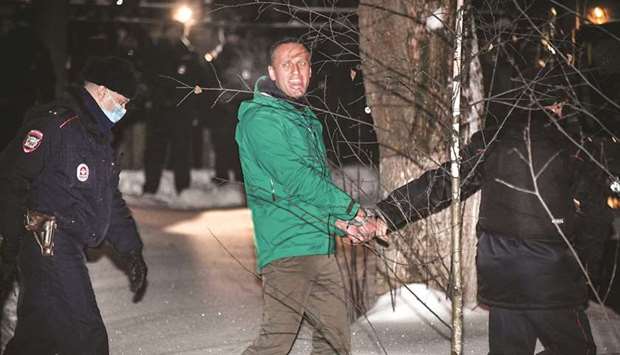A Russian judge has remanded Kremlin critic Alexei Navalny in pre-trial detention for 30 days for violating the terms of a suspended jail sentence, ignoring calls from Western countries to free the opposition politician immediately.
The ruling, a day after police detained him at the airport when he returned to Russia for the first time since being poisoned by a military-grade nerve agent last August, could be the prelude to him being jailed for years.
Moscow’s prison service has applied to convert a suspended three-and-a-half year embezzlement sentence in the same case, which he says was trumped up, into real jail time early next month.
He faces three other separate criminal cases too.
The United Nations and Western countries told Moscow before the ruling to let Navalny go, and some countries have called for new sanctions after earlier penalties from the EU over his poisoning.
Moscow told them to mind their own business.
Navalny, in a video released on Twitter after the ruling, urged Russians to protest.
“Don’t be afraid, take to the streets. Don’t go out for me, go out for yourself and your future,” Navalny said.
Leonid Volkov, a Navalny ally, wrote on Twitter that supporters would hold rallies nationwide on Saturday.
Navalny, 44, called his treatment illegal under Russian law and accused President Vladimir Putin of throwing the criminal code out of the window in fear.
The Kremlin did not respond, but has previously said that Navalny must face justice if he has done anything wrong.
About 200 Navalny supporters had gathered outside the police station in freezing temperatures and demanded he be set free, a Reuters witness said.
Four masked police officers detained Navalny at passport control on Sunday evening as he returned to Russia after being treated in Germany for what German military tests showed was poisoning by a Novichok nerve agent, a version of events the Kremlin rejects.
The Russian foreign ministry has brushed off criticism.
“Respect international law, do not encroach on national legislation of sovereign states and address problems in your own country,” foreign ministry spokeswoman Maria Zakharova wrote on Facebook.
Foreign Minister Sergei Lavrov said Western countries’ expressions of outrage were designed to distract their citizens’ attention from domestic problems and that Moscow was unfazed by potential damage to its image.
“We should probably think about our image, but we’re not young ladies going to a ball,” Lavrov told reporters.
Moscow residents interviewed by Reuters TV were divided on Navalny’s detention.
“He probably did the right thing and acted like a real man (by returning),” said one Muscovite, Yuri Elizarov. “But from a political viewpoint he didn’t, because nothing is probably going to change here in the coming years.”

Navalny is escorted out of a police station in Khimki, outside Moscow, following the court ruling that ordered him jailed for 30 days.
